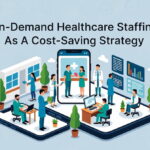According to a study, 55% of patients like telehealth visits more than physical consultations which shows how quickly patient engagement is changing. This change emphasizes the importance of healthcare providers looking for new ways to improve patient and community engagement.
On that note, public relations (PR) in the healthcare sector has the important function of connecting health service providers with their communities. As healthcare keeps changing with new technologies and patient hopes, healthcare PR strategies must also evolve to guarantee efficient communication, build trust, and foster good relationships between healthcare providers and patients.
In this blog post, we’ll discuss the very important role that PR plays in the healthcare sector. We’ll also explore strategies for engaging as well as look into future trends shaping this crucial area of communication within health services.
Understanding Patient and Community Engagement
Patient engagement is very important for enhancing results in healthcare. It means giving patients the ability to participate actively in processes related to their health, such as learning about it and being part of decision-making. When a patient engages with their healthcare provider, they are more likely to stick with treatment plans and take responsibility for maintaining good health which then leads to improved overall outcomes.
On the other hand, by working closely with local leaders of communities, organizations, and establishments, healthcare providers can discover and manage common health problems. This type of collaboration promotes a culture of health while also building trust in the people who offer medical help. It ensures that those providing healthcare are relevant and reachable for the community they serve.
Strategies for Effective PR in Healthcare
Creating a patient-focused communication plan is crucial to customizing healthcare messages for various patient demographics. Knowing the distinct requirements, likes, and responses of different groups of patients enables healthcare providers to transmit personalized health details efficiently. Such a method improves patient education and boosts their engagement and authority in making decisions about their health.
To have better community relationships, it is important to work together with people and groups in the community. This can be done by participating in health fairs, workshops, and other events happening within the area where you provide services. This shows your dedication to dealing with local health issues while also trying to enhance overall public health results through various activities that happen locally. When healthcare providers interact with their community in a significant manner, they can create trust relationships while promoting open conversation; this helps them improve their standing as the main provider of healthcare within the given region.
Using social media and digital platforms to spread health information is very important because they help in reaching more people. On these platforms, healthcare organizations can put up educational content, advertise campaigns for health awareness, and interact with patients and the community instantly.
Media Relations and Crisis Communication
For healthcare PR, it is very important to build good connections with the media. This helps in making sure that healthcare-related subjects are covered accurately and at the right times. In a crisis, clear and prompt communication with the media can aid healthcare organizations in handling the situation well by giving accurate details for public knowledge, thus maintaining trust. Managing media relations and dealing with crisis communication strategies beforehand will help professionals in healthcare PR reduce the effects of a bad reputation on their organization’s image.
Measuring the Impact of PR Efforts
To understand the effect of PR attempts, you need to keep a record of different measures like patient satisfaction ratings, rates at which social media users engage with posts, and also how well community events go. These measurements give a useful understanding of the success of PR plans and actions. By consistently assessing PR efforts, healthcare PR experts show that their activities are worthwhile and enhance communication methods for achieving organizational goals efficiently.
Challenges and Considerations
Healthcare PR faces several challenges, including maintaining patient confidentiality, navigating misinformation, and addressing public skepticism. Ethical considerations are crucial in this context, particularly when handling sensitive patient information and ensuring compliance with healthcare regulations. Addressing misinformation swiftly and effectively is crucial to maintaining public trust and credibility, emphasizing the importance of accurate and transparent communication in healthcare PR practices.
Future Trends in Healthcare PR
The future of healthcare PR will be shaped by advancements in digital health communication and emerging technologies. Predictive insights and custom-tailored communication strategies may be greatly enhanced by artificial intelligence and machine learning.
These advancements can increase patient engagement through personalized health information as well as enhance communication efficiency within healthcare environments. Additionally, there will probably be an ongoing focus on telehealth and remote monitoring. This means that new PR methods are needed to talk with patients better and adjust to changes in how healthcare is given.

Conclusion
For better healthcare results and trust-building, it is very important to engage patients and communities through good PR strategies. By concentrating on communication centered around patients, using digital platforms well, and maintaining good media relationships, healthcare providers can improve how they engage with people. Looking ahead to future trends and dealing with problems will make sure that PR continues to be successful and important.
Did you find this helpful? Check out our other helpful articles on our website.
Read Also
- Revolutionizing Patient Engagement: Innovative Solutions for Improved Care and Treatment SuccessNavigating healthcare system can often feel overwhelming for patients. Between appointments, prescriptions, and treatment regimens, it’s easy for crucial details to get lost in the shuffle. That’s why effective patient engagement and support solutions are more important than ever. Companies like Serva Health, with their pharma hub services, are stepping up to ensure that patients… Read more: Revolutionizing Patient Engagement: Innovative Solutions for Improved Care and Treatment Success
- On-Demand Healthcare Staffing As A Cost-Saving StrategyThis is an exciting and challenging time for the healthcare industry. Technology is advancing almost faster than humans can keep pace. New legislation is creating fresh challenges for the future of healthcare, and the shifting population demographic continues to place more pressure on healthcare facilities. Amidst these changes, healthcare facilities are facing a critical staffing… Read more: On-Demand Healthcare Staffing As A Cost-Saving Strategy
- The Benefits of Contract Labor Staffing in HealthcareThe most successful healthcare facilities today aren’t just reacting to crises—they are building workforce resilience to withstand them. Unpredictable patient demand, coupled with persistent nursing shortages, has made the traditional staffing model obsolete. Relying on mandatory overtime to cover a sudden surge in capacity is a recipe for high turnover and rising employee burnout relief… Read more: The Benefits of Contract Labor Staffing in Healthcare
- Management Reinforcement for Healthcare Providers in a Shifting SystemHealthcare is changing faster than ever. So, providers are feeling the pressure to keep up. New technology, changing patient needs, and constant rule updates make it tough for managers to stay on top. Strong leadership helps teams work better, give great care, and stay happy in their jobs. Here’s how healthcare leaders can strengthen their… Read more: Management Reinforcement for Healthcare Providers in a Shifting System
- Why Effective Disinfection Remains the Foundation of Public HealthFrom hospitals and schools to transport hubs and food production sites, disinfection is central to breaking the chain of infection and protecting community health. The COVID-19 pandemic highlighted how crucial surface hygiene and environmental control are in reducing the spread of harmful microorganisms. Yet, beyond emergency response, routine and validated disinfection practices remain the cornerstone… Read more: Why Effective Disinfection Remains the Foundation of Public Health
- How to Navigate Your Medical Assistant Career PathBecoming a medical assistant can feel both exciting and a little stressful. This job lets you work closely with doctors and other healthcare workers to help patients. But with so many different paths to take, it can be hard to know where to start or how to plan your career. Wouldn’t it be nice to… Read more: How to Navigate Your Medical Assistant Career Path
- Benefits of Enrolling in Botox Training CoursesMany people want to enhance their skills in the beauty field, and one way to do that is through Botox training. With the rising popularity of Botox, enrolling in training courses can set you on a path to a rewarding career. If you are considering this option, you might be curious about the benefits that… Read more: Benefits of Enrolling in Botox Training Courses
- How Pilates Certification Enhances Professional Growth in HealthcareAre you looking for a way to expand your skills and stand out in healthcare? Pilates certification can be a powerful step in your professional journey. It not only helps you understand movement and body mechanics. It also gives you tools to support patient recovery. It also improves mobility, and promotes wellness. Ready to see… Read more: How Pilates Certification Enhances Professional Growth in Healthcare









